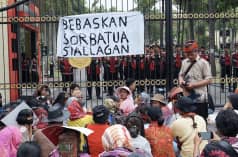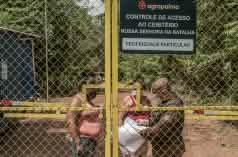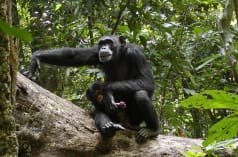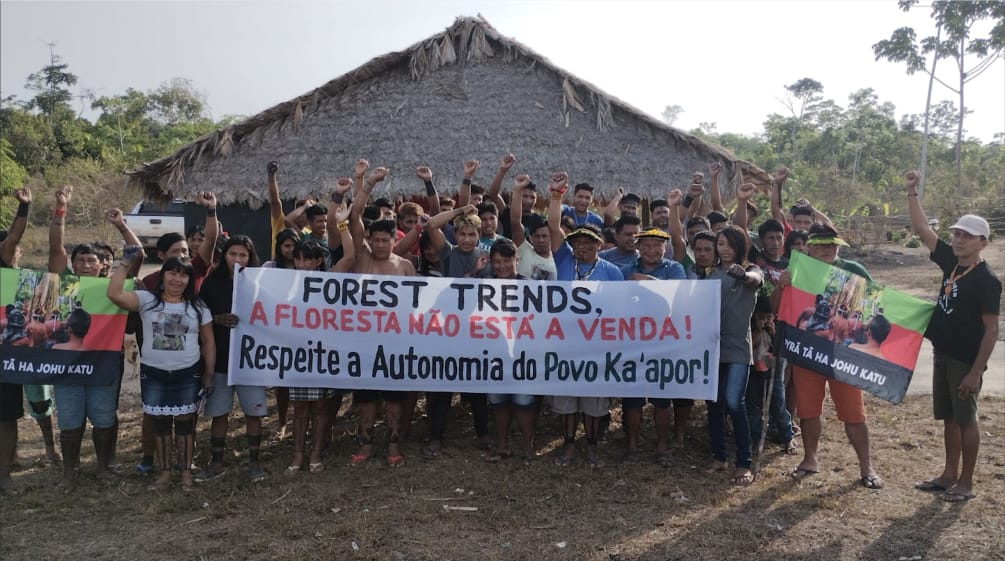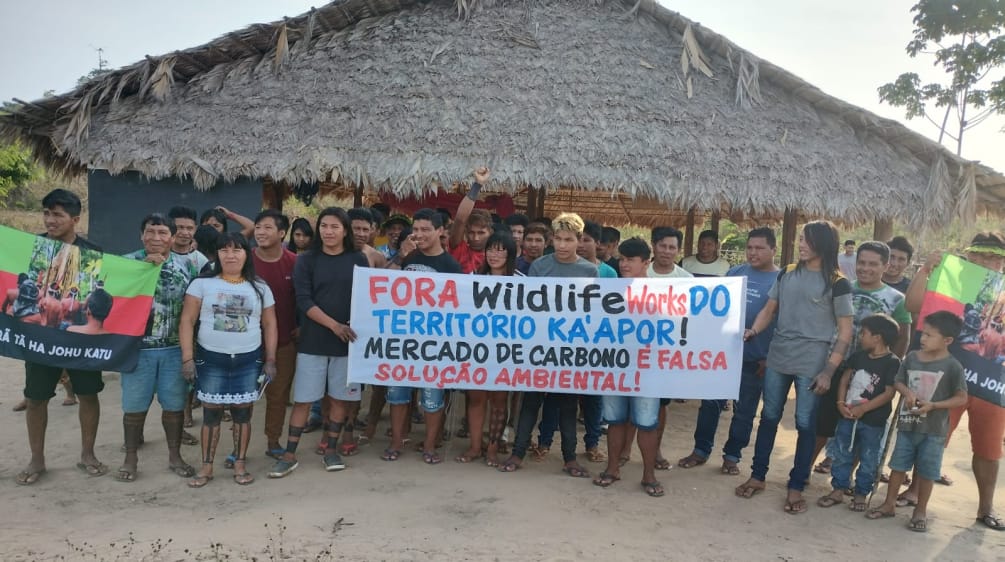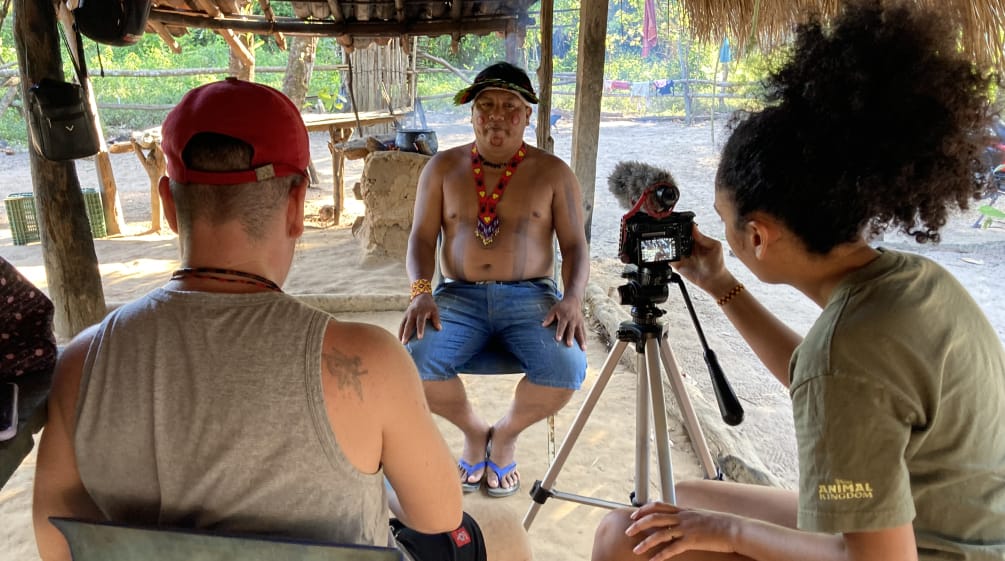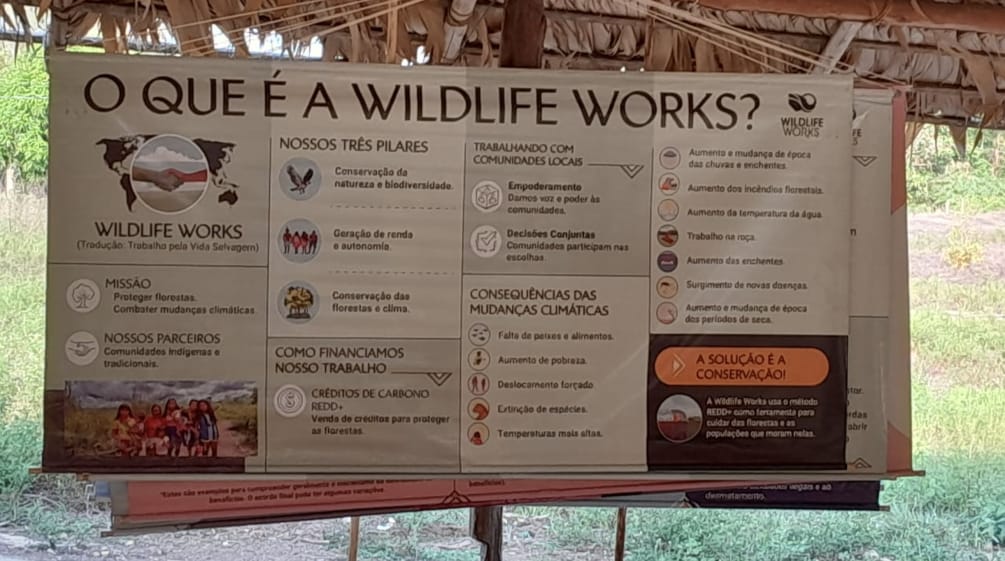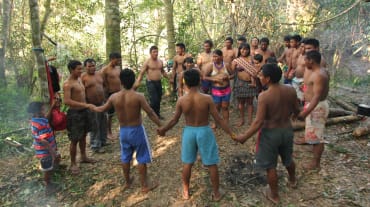Brazil: US carbon traders stoke conflict among Indigenous Ka'apor
Dec 15, 2023
A US company is intending to cash in on the rainforest of the Indigenous Ka'apor people in Brazil. It plans to generate carbon credits in the Ka'apor territory and sell them to companies wishing to offset their emissions. Our partners from the Ka'apor Council are against the commercialization of their territory and complain of conflicts stoked by the climate traders.
The Brazilian news site The Intercept reports that a company and an NGO from the USA are sowing conflict in the ancestral territory of the Indigenous Ka'apor people in the Amazon region. They are proposing a carbon trade deal that is already causing heated internal disagreement.
The company Wildlife Works and the organization Forest Trends had entered the Indigenous territory (TI) of Alto Turiaçú in the northwest of the state of Maranhão and held meetings there with a Ka'apor group that represents only a portion of the area's inhabitants. Agreements were made that violated Convention 169 of the International Labor Organization (ILO), the right to a free, prior and informed consent process prescribed for Indigenous peoples.
Our partners from the Ka'apor Council - Tuxa Ta Pame - have been reporting to us since last spring about unwelcome advances by carbon traders. They reject their actions and have sent us photos with banners clearly calling on Wildlife Works and Forest Trends to "respect the autonomy of the Ka'apor people" and to "leave their territory", because "the rainforest is not for sale".
According to the Ka'apor Council, Wildlife Works and Forest Trends have been meeting with representatives of the Ka'apor Associação Ka'apor Ta Hury do Rio Gurupi, which would be in favor of the project, since the beginning of the year. The meetings take place at the association's headquarters in Zé Doca. The Ka'apor Council was not invited to the meetings by the company or the NGO.
Wildlife Works and Forest Trends claim that the Indigenous people would live better in their territory with the money to be made from the sale of carbon credits to companies that impact the climate with their emissions. However, details of the project were never presented to the leaders of the Indigenous council.
According to The Intercept report published on November 27, Wildlife Works has already signed a document with the Associação Ka'apor Ta Hury do Rio Gurupi. It is "a kind of memorandum of understanding on the basics of the business". According to the article, Wildlife Works is not registered in Brazil and is not allowed to operate in the country under Brazilian law.
The president of the Associação Ka'apor Ta Hury do Rio Gurupi, Iracadju Ka'apor, told The Intercept that the contract with Wildlife Works would last at least ten years and that an initial donation of the equivalent of around 75,000 euros "is planned for the monitoring and protection of the territory by the Indigenous people". The Indigenous person also spoke of revenues amounting to nearly 400,000 euros per month from the sale of carbon credits earmarked for healthcare, education, culture and the protection of the territory. Neither the association nor Wildlife Works or Forest Trends provided The Intercept with specific details of the project.
Commercialization of nature
During a visit to the Ka'apor territory by Rainforest Rescue activists in August, Itahu Ka'apor, member of the Indigenous council Tuxa Ta Pame, reported on the problems that projects for the commercialization of nature cause for the Ka'apor. Money transactions are not the basis for relations between the Indigenous inhabitants. Rather, they are concerned with community, ancestry, autonomy and the interactions between humans and other living beings in their territory. These include the forests, animals, water and spirits that guard the forests.
Itahu Ka'apor explains to The Intercept how officials from the Federal National Indigenous Authority (FUNAI) convinced them to sell tropical timber from the territory between 2006 and 2013: "We were deceived by the state itself, by FUNAI, by the federal government," he explains. "Their speeches were very good: we will sell the wood of dead trees. And we fell into this temptation. This experience has brought a lot of suffering and even murder. Indigenous people are still dying as a result. We do not accept the carbon trade project because it will exacerbate internal conflicts and division. And we don't want that anymore," says Itahu Ka'apor in the article.
Lider Sucre, Vice President for Latin America of Wildlife Works, does recognize in the article that the money that would come into the territory with this type of project could lead to violence and death among the Indigenous people. He uses this argument to avoid giving any details about the potential profits from the sale of carbon credits from the Ka'apor's Alto Turiaçú territory:
"If I give you a percentage of the project today and the sales of the project later, one can do the math on how much the Indigenous people received. Around the world and in Latin America, we live in an environment where many Indigenous leaders and environmentalists are dying over issues that have to do with money," says Sucre.
Executive recognizes problem
According to The Intercept, the company manager acknowledges the existing potential for violence that the company is bringing to Indigenous territory with the carbon project, but seems indifferent to it and puts the responsibility on the Ka'apor to ensure their own safety. "This is an issue that the Indigenous association itself will tackle with enough time and in a responsible way using its own resources. It is a process that requires a certain amount of planning and maturity," says Sucre.
REDD-Monitor, an international online watchdog for REDD projects, picked up on the article by The Intercept. In early November, the British newspaper The Guardian also published an article about the abuses of Wildlife Works. The Guardian states that Wildlife Works employees have been accused of massive sexual harassment and sexual abuse for more than a decade as part of a carbon project in Kenya.
Further complaints about harassment
Our partners from the Ka'apor Council Tuxa Ta Pame also told us that representatives of Wildlife Works had entered one of the Ka'apor villages accompanied by a group of Indigenous Tembé from the neighboring state of Pará. They had met with the inhabitants there, who spoke hardly any Portuguese. The company representatives are said to have explained that the Ka'por could benefit if they signed the minutes of the meeting.
Brazilian lawyer Diogo Cabral, who advises the Ka'apor Council, posted their complaint on his Instagram channel with a photo of a company information panel presented at the meeting.
Rainforest Rescue calls on the relevant Brazilian authorities, including the Federal Public Prosecutor's Office (MPF), to investigate the activities of Wildlife Works and Forest Trends to implement their planned carbon trading project in the Indigenous territory of Alto Turiaçú based on the complaints of the Ka'apor Council Tuxa Ta Pame. The lack of prior, free and informed consent, as stipulated in ILO Convention 169, deserves particular attention.
REDD-MonitorREDD-Monitor, December 1, 2023. How a proposed REDD project by Wildlife Works and Forest Trends in Maranhão, Brazil is fuelling Indigenous conflict: https://reddmonitor.substack.com/p/how-a-proposed-redd-project-by-wildlife
articleThe Guardian, November 11, 2023. Allegations of extensive sexual abuse at Kenyan offsetting project used by Shell and Netflix: https://www.theguardian.com/environment/2023/nov/07/accusations-of-widespread-sexual-abuse-at-offsetting-project-used-by-netflix-and-shell-aoe
